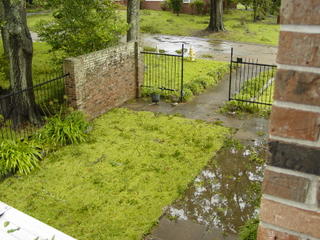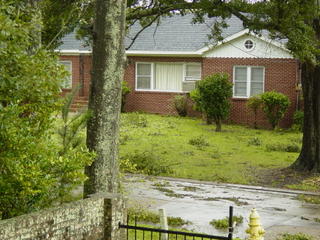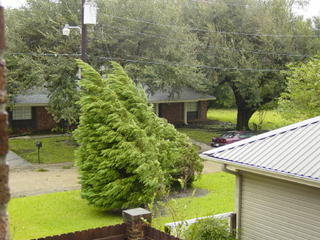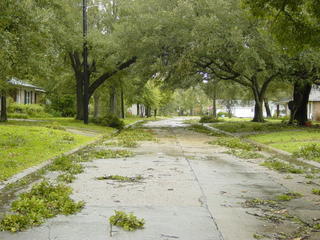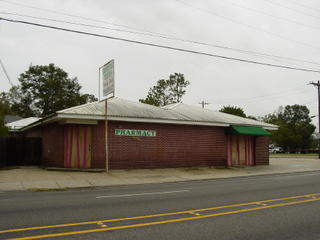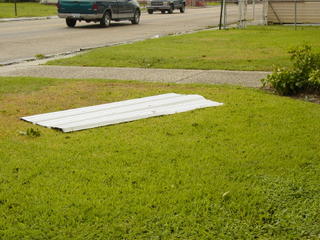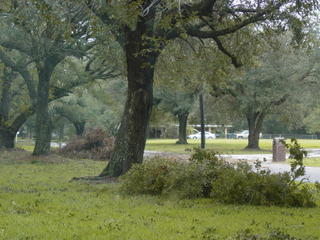It is probably the most oft asked but least answered questions throughout history. It is the inquiry that seeks to ascertain why the unimaginable happens. The question may take different forms such as, “Why do terrible things happen?” or, “Why do bad things happen to good people?” or, “How could a loving God allow such a disastrous event to occur?” Although the question may take be fashioned in many different ways, when it is distilled the major component is always “why?”
I should probably preface this discussion with the disclaimer that this attempt is more of a personal quest to answer the age-old question and less a definitive explanation. I will be the first to acknowledge that I do not have the answer to this question, as well as many others. This effort is more of a stage on my journey as I reflect on the magnitude of the events of the past week (i.e. Hurricane Katrina and the aftermath of the storm). Again, this is not a systematic theology nor is it an exhaustive response; this is simply a personal reflection still in its preliminary stages.
I have not yet witnessed “preachers” or “televangelists” attempt to explain why Hurricane Katrina devastated the Gulf Coast region and destruction resulting from the storm. I imagine that there are many who utilized their position and the open ears of their congregation (and, in some cases, television audience) to attempt to explain these tragic events as a judgment from God. They probably alluded to the casinos of New Orleans and the Mississippi coast (namely Gulfport and Biloxi) and the notorious “debauchery” of New Orleans, including drunkenness and “fornication.” They possibly used Old Testament references, most likely referring first to the destruction of Sodom and Gomorrah and to Noah, to substantiate their position. Those that really wanted to be “original,” possibly referred to the invasion of Israel by the Assyrians and Judah by the Babylonians, with references to the prophets Isaiah, Jeremiah, Habakkuk, and others. Is this really the answer? Was it simply that God was angry with the people of the region that He decided to destroy the property and, at the same time, lives? What about the good that was in the city and region, would the good be destroyed with the bad?
I prefer to reflect along a little different path. My answer to the question of why do bad things happen begins with an understanding that sin exists in the world. The biblical material provides the understanding that sin entered the world through Adam (Romans 5:12ff) and there are ramifications for living in a world where sin exists, such as the need to work for food and pain during child bearing (Genesis 3:16-19). The primary affect of living in a world marred by sin is that the world is not as it should be. The creation is as much ruined by the sin of man as man’s relationship with the creator is ruined because of sin.
Please do not understand that I am reinforcing the argument that these events occurred because of the sin of the people in the region; rather, recognize that sin exists and, because of the fact that we live in a fallen world, bad things to happen. Yes, there is a penalty for sin. In the New Testament, we find two realities: that sin is personal (Romans 3:23) and the just compensation for sin is death (Romans 6:23a). Sin is personal in that every person is faced with moral choices-choices they know to be right and wrong. At some point, even the most moral person chooses what they know to be wrong and, therefore, sins. While the fair result of sin is death, eternal separation from God, God has provided a way to forgiveness and life. Even while we were sinners God demonstrated His love for us (Romans 5:8) so that, by faith in His Son, Jesus Christ, we might have eternal life (Romans 6:23b). All this to say, a New Testament understanding of the effect of sin leads one to the understanding that if God was in the business of destroying cities and people because of sin, there would not be a single inhabitable place on the planet and there would be no one alive. Instead, God’s love provides individual’s with a lifetime to choose eternal life through faith in Christ or eternal separation from God in a very real place of torment called hell; after a person’s life is over they must, they must face the final consequences for their own sin.
I cannot pretend to understand why this has happened, though an understanding of the results of sin helps me understand that this world is not as it could, and it really should, be. I also cannot dream of how this fits into God’s plan for the world, though I rest confidently that God is in control and that He has a plan, though it often does not make sense to me (probably because it does not have to make sense to me, I am not in control). Like Abraham, whose account begins in Genesis 12:1 with an amazing call to leave everything that was safe and secure to live a life of faith in God as provider, I must trust that God has control of the big picture. I must confess as Isaiah proclaimed God’s message, “For as heaven is higher than earth, so My ways are higher than your ways, and My thoughts than your thoughts.” Isaiah 55:9
No reflection on suffering can be complete without some reflection on the seemingly unjust suffering of Job. The biblical account claims that Job was righteous, but still suffered great losses. In his search for an answer to the question of why, God responds to Job by reminding him that He is in control. God says:
Who is this who obscures [My] counsel with ignorant words? Get ready to answer Me like a man; when I question you, you will inform Me. Where were you when I established the earth? Tell [Me], if you have understanding. Who fixed its dimensions? Certainly you know! Who stretched a measuring line across it? What supports its foundations? Or who laid its cornerstone while the morning stars sang together and all the sons of God shouted for joy? Who enclosed the sea behind doors when it burst from the womb, when I made the clouds its garment and thick darkness its blanket, when I determined its boundaries and put [its]bars and doors in place, when I declared: “You may come this far, but no farther; your proud waves stop here?” (Job 38:2-11)
My response to His power must also be as Job’s when he says:
I know that You can do anything and no plan of Yours can be thwarted. [You asked,] “Who is this who conceals [My] counsel with ignorance?” Surely I spoke about things I did not understand, things too wonderful for me to know. [You said,]“Listen now, and I will speak. When I question you, you will inform Me.” (Job 42:2-4)
I don’t know if what I just wrote makes much sense or if it is even coherent. But this is just the beginning of my reflection on the question. In the future, I may reflect again on this question, but I will probably consider some lessons from the storm and its aftermath.
 Well, I have a little milk fund of my own going on; though, I am not going to use the money for the same purpose as the boys in the movie. Instead, I think I am going to use the money to purchase an engagement ring when the time comes. This is how it works: I empty my loose change from my pockets into these milk bottles at the end of each day. I also have a jelly jar in my truck so I can deposit change from when I go through a drive through or after I buy a snowball (this encourages me to save because I don't spend my change this way).
Well, I have a little milk fund of my own going on; though, I am not going to use the money for the same purpose as the boys in the movie. Instead, I think I am going to use the money to purchase an engagement ring when the time comes. This is how it works: I empty my loose change from my pockets into these milk bottles at the end of each day. I also have a jelly jar in my truck so I can deposit change from when I go through a drive through or after I buy a snowball (this encourages me to save because I don't spend my change this way). 